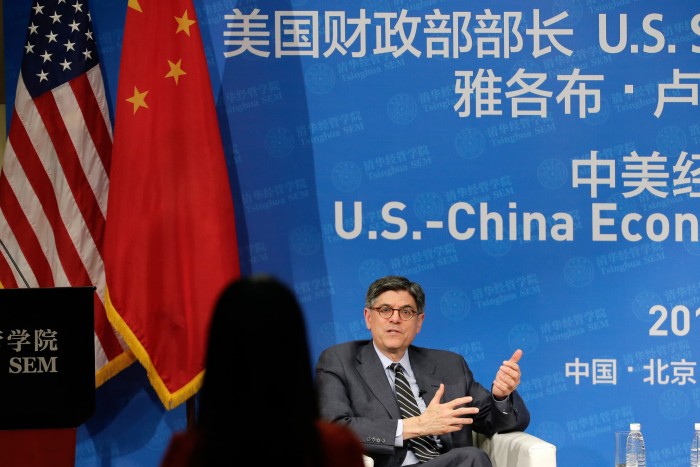Media Report

- Reuters reports: "Senior U.S. officials pressed China again on Tuesday to reduce barriers for foreign businesses, saying concerns had grown as the regulatory environment became more complex, and they also bought up concerns over a new law on foreign non-governmental groups....'Our two governments have a responsibility to foster conditions that facilitate continued and increased investment, trade, and commercial cooperation,' [U.S. Treasury Secretary Jack Lew] said, on the second day of high-level talks between the two countries in Beijing....Secretary of State John Kerry, speaking at the same event, said that as the two economies become more intertwined in shared prosperity, they have more 'skin in the game' to keep their economic relationship on an even keel....In a press conference marking the end of the talks, Kerry said President Xi Jinping gave assurances that China 'intends to remain open' and 'does not see that these laws are going to be applied in any way whatsoever that affects the ability to open up and to do business'."
- The Wall Street Journal reports: "By alarming neighbors with its activities in the South China Sea, China risks 'erecting a Great Wall of self-isolation,' U.S. Defense Secretary Ash Carter told a high-level security gathering in Singapore over the weekend, drawing an instant rebuke from a Chinese admiral. 'We were not isolated in the past, we are not isolated now, and we will not be isolated in the future,' retorted Sun Jianguo, deputy chief of the Joint Staff Department of China's Central Military Commission....In fact, China's size and influence at the heart of the world's fastest-growing region—inextricably linked to its neighbors by transport, logistics and financial networks—is partly what emboldens China in its escalating regional rivalry with the U.S., while limiting the Pentagon's military options and, at times, making it look like a paper tiger....Indeed, the centrality of China, not just as a regional player but in global affairs—everything from Middle East security to climate change—makes it a rival like none other America has faced. The Pentagon, despite its often blunt rhetoric, tiptoes carefully."
- The New York Times reports: "Secretary of State John Kerry and his Chinese counterpart laid out diverging positions regarding the South China Sea on Tuesday, indicating that annual talks between the United States and China had done little to bridge the differences over what has become one of the most volatile issues in their relationship....On Tuesday, at the end of what is called the Strategic and Economic Dialogue, Mr. Kerry praised the talks as an 'essential mechanism' to air differences and nurture cooperation. But comments both by Mr. Kerry and by State Councilor Yang Jiechi of China suggested that their governments remained far apart on the continuing disputes in the South China Sea."
Calendar
- 2016-06-06 China to submit 'negative list' for U.S. investment treaty talks next week
- 2016-06-05 Maritime Spat Simmers as U.S., China Talk
- 2016-06-03 U.S. to Urge China to Put More Pressure on North Korea
- 2016-06-02 China tells U.S., don't let allies set South China Sea policy
- 2016-06-01 President Trump would hand the world to China
- 2016-05-31 China to 'pressure' U.S. on maritime issues, paper says
- 2016-05-30 For many Chinese migrants, the lure of the city is fading
- 2016-05-29 China Default Chain Reaction Threatens Products Worth 35% of GDP
- 2016-05-27 G-7 leaders express concern over South China Sea, urge peace
- 2016-05-27 G-7 leaders express concern over South China Sea, urge peace
News
- The Wall Street Journal China Shrugs Off U.S., Confident in Its Magnetic Allure
- The New York Times U.S. and China Offer Competing Views on Disputed Sea
- Reuters U.S. presses China to reduce barriers for foreign business
- The Wall Street Journal European Firms Find 'Increasingly Hostile' Environment in China
- The Washington Post Hong Kong teen activist acquitted over 2014 China protest
- Bloomberg Business China Paused Monthly Gold Purchases in May After Prices Surged
- Reuters China tells U.S. to play constructive South China Sea role
- The New York Times Caught Between China and Taiwan, and Leaning Toward China
- The Financial Times China's richest man battles Disney for hearts and wallets
- CNBC OCBC says China's focus on yuan value against currency basket is working
- The Washington Post 74 on trial in China over murder for compensation plots
- Bloomberg Business Beware China's Shadow Banks
- Reuters China gives U.S. investment quota for first time to deepen financial ties
Commentary
- Foreign Policy: The Cable Europeans Push Back Against Beijing in the South China Sea
- The New Yorker Harmony and Martyrdom Among China's Hui Muslims
- The National Interest How Vietnam Can Stop the South China Sea ADIZ
- The Diplomat US-China Strategic Nuclear Terminology: A Primer
- The New York Times: Sinosphere China Threatens Jail Time for College Entrance Exam Cheaters
- The Wall Street Journal Why the U.S. Steel Industry Is Molten Hot Over China's Trade Practices
- The Diplomat China's Internet Policy Offers the Wrong Kind of Lessons
